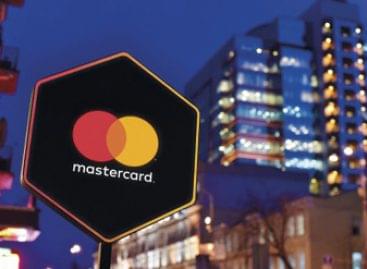Card payments are now a basic requirement for merchants
“Card acceptance today is like a utility service: a basic expectation. Businesses that do not offer this are at a serious market disadvantage,” says Ferenc Szász, Business Development Director for Mastercard’s card acceptance division. With his expertise, we explored how the proliferation of card terminals has transformed payment habits and the practical benefits card acceptance offers to merchants.
The number of places accepting cards has more than doubled in recent years

Ferenc Szász, Business Development Director for Mastercard’s card acceptance division
Since 2018, the availability of card payments in Hungary has jumped by 73%, largely due to Mastercard’s Doppio program launched in 2019.
“3 év alatt megduplázódott a magyarországi kártyaelfogadó helyek száma. Amikor a programot elkezdtük, 150 ezer kereskedőnél lehetett kártyával fizetni az országban, ma már közel 300 ezer helyen érhető el a kártyaelfogadás”
– highlights Szász. In practice, this means that card payment infrastructure has expanded not only in major cities but also in smaller towns, markets, and among local producers.
The expansion of the acceptance network fundamentally transforms the shopping experience.
“More and more customers leave home with only their card or phone. If a business cannot cater to these changing habits, it risks losing not only potential revenue but also the loyalty of existing customers.”
– points out the expert.
Fewer errors and greater security
Card payments not only make life easier for users – being quick and convenient – but also for merchants.
“With an automatically integrated cashier system, payments can be initiated with a single button press, significantly reducing waiting times at the checkout and the possibility of manual input errors.”
– explains Szász.
The expert adds that card payments not only minimize errors but are also advantageous for everyone in terms of data protection due to industry regulations.
“Over the past decades, standards like PCI DSS (a global data protection standard) and PSD2 (an EU directive on payment services regulation) have ensured that both merchants and customers feel secure. When paying by card, sensitive customer data is not accessible to merchants; in physical environments, terminals encrypt the data during the reading process, while in online transactions, tokens are increasingly used to anonymize the data.”
This not only enhances customer security but also protects merchants from the risk of data breaches. Thanks to Mastercard’s network available in over 200 countries, a secure payment experience is guaranteed almost anywhere in the world, providing a competitive edge for businesses serving an international audience.
The cost of card acceptance has significantly decreased
 As consumers can choose their preferred payment methods, merchants also have the freedom of choice, and according to Ferenc Szász, card acceptance has become increasingly affordable due to price competition:
As consumers can choose their preferred payment methods, merchants also have the freedom of choice, and according to Ferenc Szász, card acceptance has become increasingly affordable due to price competition:
“Today, more than 30 companies offering card acceptance services are competing in Hungary, which has significantly reduced the cost of card acceptance to around 1-1.5% over the past 2-3 years.”
The expert adds that card acceptance is not only financially advantageous but also saves time and labor hours.
“Think about how much time it takes to count daily cash revenues, manage it, and deposit it at the bank. With terminal payments, all this can be eliminated from the daily routine.”
More sustainable payments without terminals and receipts
Physical terminals are no longer strictly necessary for payments: the SoftPOS (Smartphone Point of Sale) technology introduced by Mastercard and its partners allows a smartphone or tablet to function as a terminal.
“Setting up a SoftPOS is so simple today that a merchant can make the system operational in just a few steps through online registration and app download, becoming a card-accepting business in no time.”
– says Szász.
The further digitization of payment processes and sustainability are also supported by Mastercard’s GreenPOS (Green Point of Sale) initiative: digital receipts allow customers to access transaction records via email or mobile apps.
“This saves tons of paper annually while also reducing merchants’ operating costs.”
Card payments as a utility service
“Card acceptance today is like a utility service: a basic expectation. Businesses that do not offer this are at a serious market disadvantage.”
– summarizes Ferenc Szász. The rapid development of digital payment infrastructure provides an opportunity for merchants to reach a wider customer base while simplifying their operations. Mastercard’s goal is to further develop the payment market in Hungary, aiming to increase the share of digital payment traffic from the current 38% to 60% by 2030, in line with regulatory objectives. This benefits the national economy by reducing the gray economy and boosting competitiveness.
Related news
OTP Bank won the grand prize of the 20th Mastercard – Bank of the Year competition
🎧 Hallgasd a cikket: Lejátszás Szünet Folytatás Leállítás Nyelv: Auto…
Read more >The 6 most important payment trends in 2026:
🎧 Hallgasd a cikket: Lejátszás Szünet Folytatás Leállítás Nyelv: Auto…
Read more >Related news
Renewal at Szarvasi Mozzarella – the company’s commercial activities have been strengthened under the leadership of Máté Besenczy
🎧 Hallgasd a cikket: Lejátszás Szünet Folytatás Leállítás Nyelv: Auto…
Read more >Lidl Magyarország wins Top Employer award once again
🎧 Hallgasd a cikket: Lejátszás Szünet Folytatás Leállítás Nyelv: Auto…
Read more >








